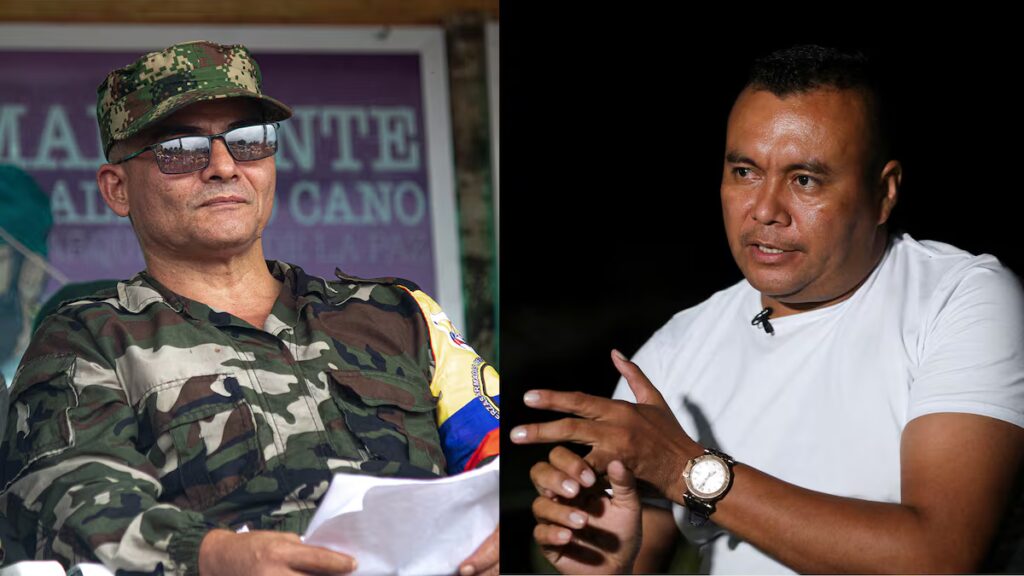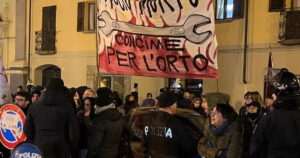
From partners to mortal enemies. The contrast between the paths of Ivan Mordisco and Calarcá Córdoba, the commanders of the two main dissidents of the extinct FARC guerrilla, is evident. Gustavo Petro’s government has launched a military offensive against the Central General Staff (EMC), the Mordisco faction that it already considers a terrorist organization, and bombs without hesitation, insisting on negotiating with Calarcá, renamed the General Staff of the Blocs and Front (EMBF). That faction, still sitting at the negotiating table, went so far as to bribe a Colombian army general and a senior official of the National Directorate of Intelligence (DNI), according to a journalistic investigation, causing a new crisis in the worn-out policy of total peace.
Politicians from the right, center and left agree on the seriousness of the complaints reported on Sunday by Noticias Caracol, which directly denounce the collaboration of General Juan Miguel Huertas and the director of operations of the DNI, Wilmar Mejía, with the Calarcá dissidents. The main revelation is the leak of confidential information to avoid public force operations in Catatumbo, southern Bolívar and Antioquia. Petro dismissed them as “fakes”.
I can say that the versions of the alleged intelligence reports about Huertas and Wimer are false.
It’s about wanting to eliminate the people who helped me identify corrupt military officials. Several cases such as the theft of army weapons in La Guajira and…
— Gustavo Petro (@petrogustavo) November 24, 2025
The paradox is that the scandal broke out a few days after the announcement of progress in the peace talks. Negotiations appeared to be stalled until Friday, when Government and FEMB delegates signed six agreements to close the seventh round of talks, which took place in secret at the Campo Hermoso inspection site in San Vicente del Caguán, in the Caquetá department in the south of the country. These points include topics such as de-escalation of conflict, with the EMBF committing not to recruit minors; access to land, with peasant reserve areas; protect natural parks and contain deforestation; and an agreement so that the 2026 elections will take place with guarantees for citizens, parties and candidates.
Although Mordisco has established himself as President Petro’s greatest public enemy, Calarcá dissidents have also perpetrated one of the worst attacks against public forces. In August, the 36th Front – which belongs to the EMBF – killed 13 police officers by shooting down an anti-drug helicopter in Amalfi, in the department of Antioquia. The dissident leader once told the newspaper The spectator that it was not a planned attack, but an effect of the clashes that occurred in the area between his men and the Gulf Clan, the largest gang dedicated to drug trafficking. Despite this setback, the table continued to move forward.
Petro, who usually directs his criticisms at Mordisco, whom he defines as a “traqueto dressed as a revolutionary”, has toughened his tone towards some of the armed groups with which he was previously willing to enter into negotiations. He even went so far as to declare that the EMC, the Second Marquetalia and the Gulf Clan – with whom he is also negotiating in Qatar – “will be considered terrorist organisations, prosecutable anywhere in the world”. But he is not usually referring to Calarcá, who until last year was considered Mordisco’s subordinate. They now compete for illicit profits in different regions. The Ombudsman’s Office, for example, issued an early warning due to the expansion of armed conflict in the vast jungle regions of the Colombian Amazon. According to the most recent intelligence estimates, the EMC has 3,900 men and the EMBF 2,800.
Alexander Díaz Mendoza, Calarcá’s real name, joined the former Revolutionary Armed Forces of Colombia at just 16 years old, in the late 1990s. There he joined at different times both the 40th Front, in the Meta department, and the Eastern Bloc, under the command of Mono Jojoy. At the end of 2016, when the guerrilla was preparing to hand over their weapons, after signing the peace agreement with the government of Juan Manuel Santos, he defected to join the ranks of Gentil Duarte, one of the first dissidents who left the peace agreement to join Mordisco. Gerson Arias, a researcher at the Ideas for Peace (FIP) Foundation, defines Calarcá as “an intermediate commander of the latest generation of the FARC”, more linked to drug trafficking, with very little relevance in the war. He is now seen as an “emerging figure”.
The inclusion of dissidents in total peace was from the first moment one of the major challenges of the Petro government’s flagship policy, which has now faded. In the plural, since different structures distanced themselves at different times from the Havana dialogues. The label “dissidents” deserves the plural, since it is an amalgam of structures that are difficult to classify.
To trace the origin of EMBF we must go back to the birth of these groups. The phenomenon was born with Mordisco in the final stretch of the peace process. One of the most representative structures of the guerrilla movement, the First Front, which operated in the south-east of the country, published a statement in which it withdraws from the negotiations, calling it “betrayal”. This announcement caused the leadership to expel five commanders, including Gentil Duarte, who they had previously sent to the area to try to restore order. Instead of convincing Bite, he let himself convince him..
Initially, the factions of Mordisco and Ivan Márquez’s Second Marquetalia consolidated as sort of large umbrellas. Both were designated as terrorist organizations by the United States and engaged in a life-or-death war, in which many of their commanders fell, most often on the other side of the border with Venezuela. Gentil Duarte was Mordisco’s most prominent partner, to the point that he was talked about the nobles. But he was also murdered in May 2022.
Mordisco has since reunited power and Calarcá has become a key element in the expansion of the self-proclaimed Central General Staff, which sat down to negotiate with the Petro government in 2023, but ended up fragmenting in 2024. This process entered its umpteenth crisis after a series of EMC actions that included attacks against the military and indigenous communities. When Mordisco got up from the table, Calarcá decided to continue. It was then that they were renamed the General Staff of the Blocs and the Front. He was even captured by the authorities at a checkpoint, but the government moved heaven and earth to let him go because he was a peacemaker. “Without Calarcá it would have been very difficult to maintain the narrative of total peace,” explains Arias. “The government is faced with the dilemma of whether to push forward with the conclusion of negotiations with dissidents at any cost and transfer the responsibility for suspending or ending these processes to the next government,” adds the expert.





